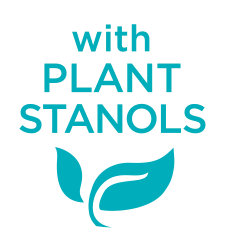Busting food and cholesterol myths
Changing the foods we eat is one of the biggest – and best – steps we can take to lower our cholesterol levels and keep our hearts happy. And while most of us know that chocolate, cakes, pastries and sausages aren’t good dietary choices, with all the myths and misinformation out there about the best and worst foods to eat for high cholesterol, it can sometimes be tricky to sift the fact from fiction. We at Benecol® have come to the rescue with our myth-busting facts on which foods we should or shouldn’t be eating to achieve healthier cholesterol levels - prepare to be surprised!
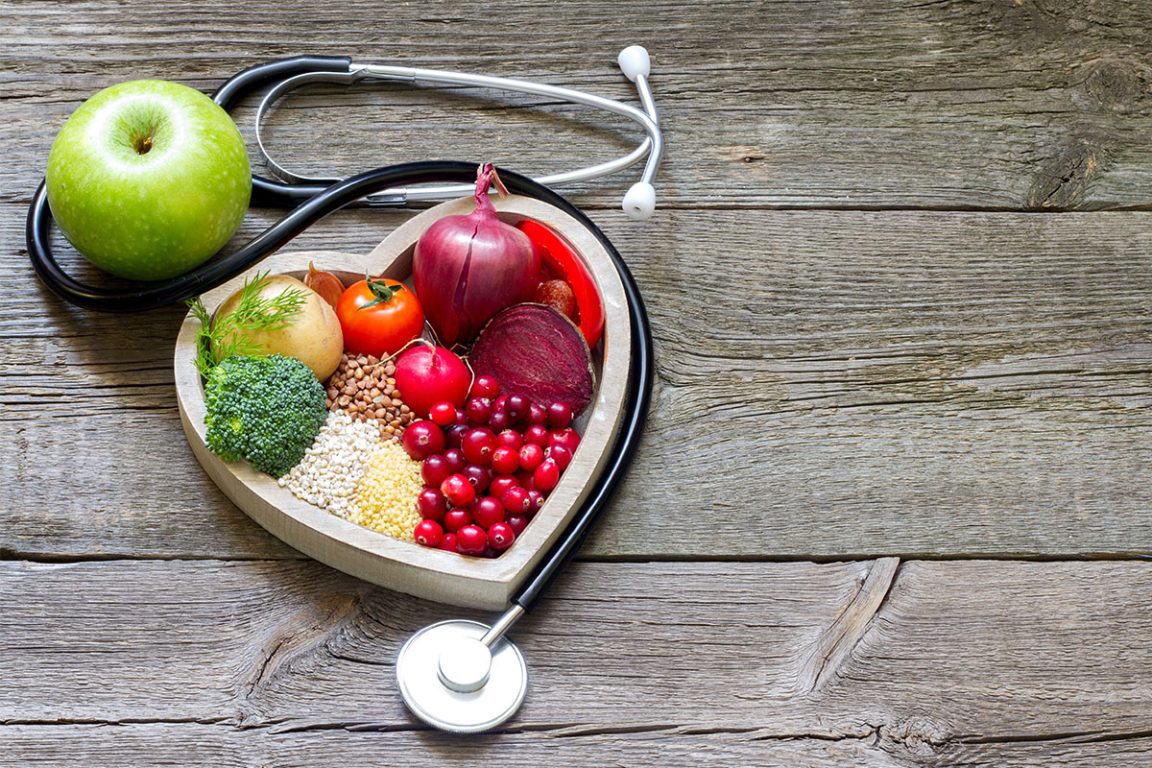
Food and cholesterol: Myth 1
Coconut oil is a healthy diet choice
FACT: Coconut oil has a good reputation among self-styled nutrition experts and wellness bloggers, but the health halo of coconut oil starts to slip when you discover that it’s made up of about 86 per cent saturated fat – about a third more than butter (at 52 per cent), and twice the amount found in lard (at 40 per cent).
Coconut oil advocates claim that some of the saturated fat presents in coconut oil – lauric acid, is a healthier type that doesn’t raise ‘bad’ cholesterol levels, like other saturated fats, but as yet there’s very little good quality evidence for this. So, don’t believe the hype – coconut oil is one of the few plant oils that is high in saturated fat – and health organisations like the HSE and the Irish Heart Foundation recommend using it only in small quantities.
What is well known is that replacing saturated fats in our diet with unsaturated fats like vegetable oils (e.g. olive, rapeseed and sunflower), and spreads made from these like Benecol®, can help to improve cholesterol levels. The bottom line – enjoy coconut oil as an occasional treat and use heart-healthy unsaturated oils and spreads – in moderation – for everyday cooking, baking and spreading.
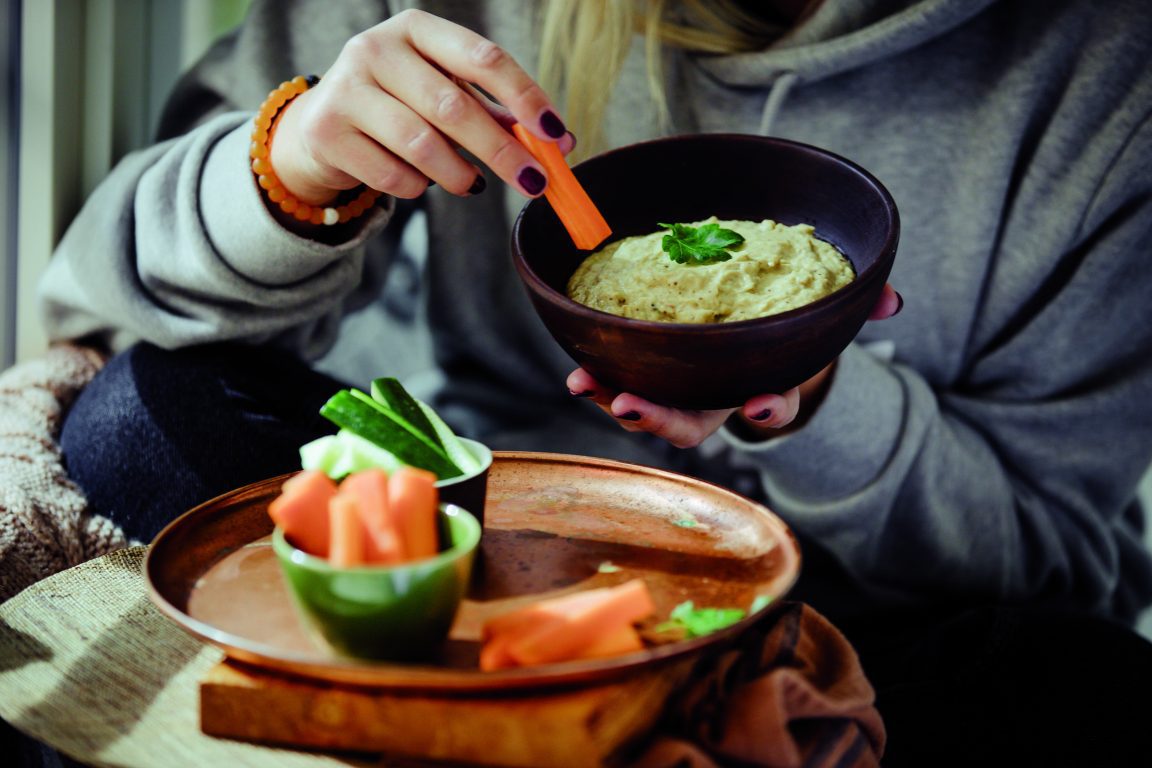
Food and cholesterol: Myth 2
Coconut milk is a heart-healthy cooking ingredient
FACT: Tinned coconut milk is an essential ingredient in many Thai, Indian and Caribbean recipes. Of course, it does have a lovely exotic flavour and adds creaminess to soups, sauces and curries, but it’s also high in fat and saturated fat – which is bad news if you’re trying to keep your cholesterol in check!
There’s around 15g of fat per 100ml in standard coconut milk, and nearly 90 per cent of this is the unhealthy saturated type. Even light coconut milk, which typically contains half the fat, is still high in saturated fat – providing 6g saturates per 100ml. So, if you’re making a homemade Thai Green Curry, use reduced-fat coconut milk and use it sparingly to keep the saturated fat down.
For adding to your tea and coffee, or for pouring over your morning muesli, heart-healthier options are unsweetened coconut drinks or ‘milk’ alternatives. These are more diluted than the tinned versions of coconut milk, and so contain much less saturated fat – similar to one per cent or semi-skimmed cow’s milk. Coconut drinks do vary in the nutrients they provide and don’t have as much protein like dairy, so check nutrition labels.
Food and cholesterol: Myth 3
Eggs: Hold back if you have high cholesterol?
FACT: Much of the confusion around eggs comes from the fact that egg yolks are rich in cholesterol. But we now know that cholesterol in eggs generally has little impact on our blood cholesterol levels – it’s too much saturated fat that’s the problem! Only familial Hypercholesterolaemia (FH) sufferers, who have an inherited condition that results in extremely high blood cholesterol levels, need to be careful about the number of eggs they eat.
So, if you have high cholesterol, you can still enjoy eating eggs, as part of a healthy diet that’s low in saturated fat. And with eggs back on the menu, you’ll be able to enjoy all of their nutritious benefits, too. Eggs are not only low in calories (fewer than 70 kcals in a medium-sized egg) and fairly low in saturated fat (at 1.3g) but they’re also a good source of protein and contain many essential vitamins and minerals, such as riboflavin, vitamin B12, vitamin D, selenium and iodine.
Remember, it’s also important to pay attention to how you cook eggs – glugs of oil for frying eggs; a little cream and a nob of butter for your scrambled eggs; and a pinch of salt over your poached eggs, can turn them into a dish that’s far less good for your heart.
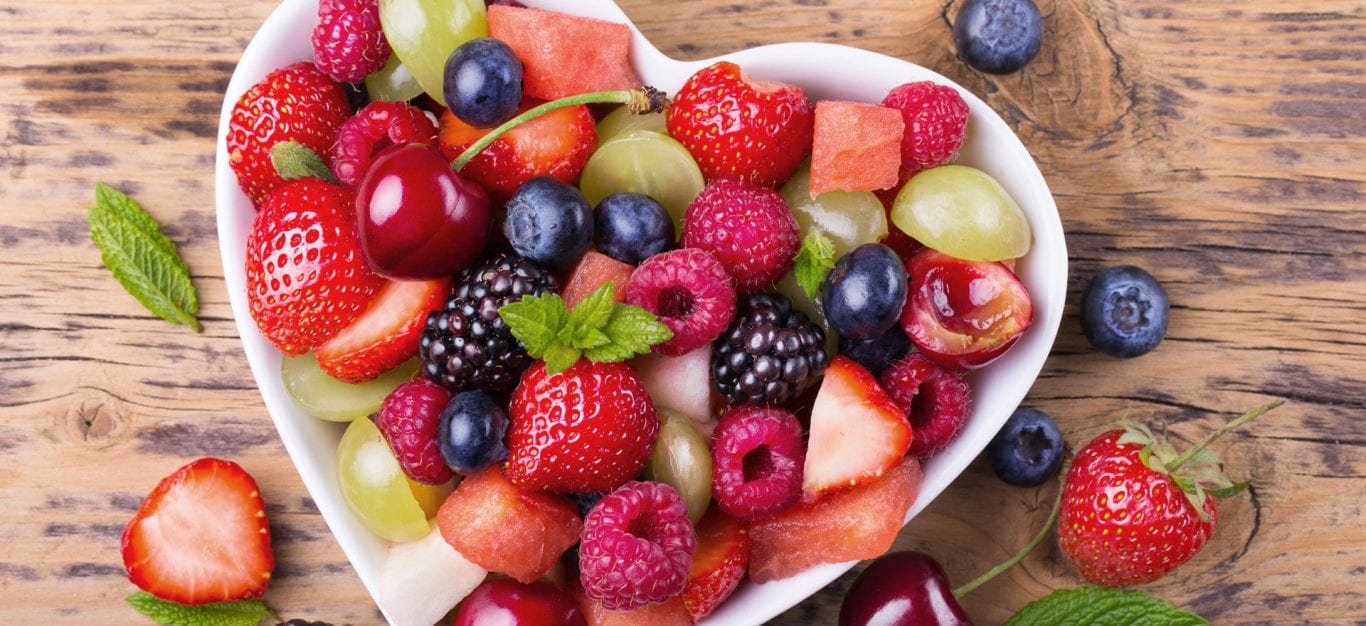
Food and cholesterol: Myth 4
Avocados are high in fat and bad for cholesterol levels
FACT: Avocados are unique among fellow fruits as their fat and calorie content is higher – half an avocado contains around 150 kcal and 16g of fat. If you care about your cholesterol, this doesn’t mean that you need to give them up – two-thirds of this fat is unsaturated (mainly monounsaturated fat), which when eaten in place of high saturated fat foods, can help maintain healthy cholesterol levels.
Better still, just half an avocado counts as one of your 5-A-Day and is loaded with nutrients that support a healthy heart, including potassium, vitamin E and fibre. And because they’re so versatile, creamy and delicious they’re a healthy stand-in for many high saturated fat ingredients like butter, mayonnaise, cheese, cream and sour cream.
But as with most things, diet-related – balance and moderation are key, so if you’re watching your waistline, you need to keep an eye on how much you consume – too much of the ‘good’ fats in smashed avocado can make you put on weight, just as easily as putting too much butter on your toast!
Food and cholesterol: Myth 5
I need to cut down on prawns to look after my cholesterol
FACT: Generally speaking, most people don’t need to cut down on the cholesterol that’s found in foods like shellfish (including prawns, crab and lobster), as they don’t have a big impact on blood cholesterol levels. It’s much more important to concentrate on limiting the amount of saturated fat you eat because eating too much can increase blood cholesterol. That’s why health officials recommend that we stick to 20g saturates a day – max.
The good news is that shellfish are naturally low in fat and saturated fat – a 150g portion of cooked prawns provides only 1.4g fat and 0.3g saturates, and they come with a wealth of important nutrients like protein, omega-3 fats (although in lower levels than in oily fish) and vitamins and minerals, which our bodies need to stay healthy.
However, if you have a family history of high cholesterol, or are at high risk of coronary heart disease and are struggling to control your cholesterol levels, you might want to be more cautious about cholesterol-rich foods. If in doubt, always seek specific advice from your GP.
Food and cholesterol: Myth 6
Fish – don’t reel it in, as fish doesn’t benefit cholesterol levels
FACT: True, but it’s not the whole heart-health picture. Health guidelines recommended we eat at least two portions (around 140g of cooked fish) of fish a week, one of which should be oily.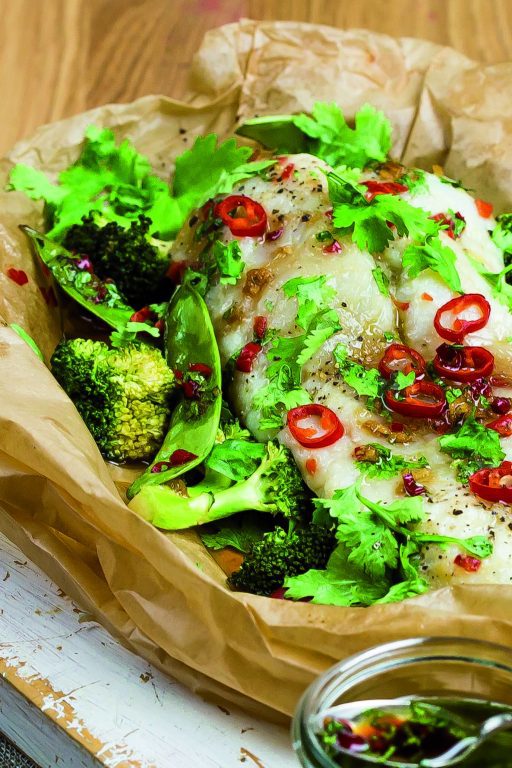
Whether white or oily, fish is a great source of protein and provides an array of different vitamins such as vitamins A and D, and minerals like calcium, zinc, iron and iodine, which many of us aren’t getting enough of. But its heart health benefits mostly come from the fact that oily fish such as salmon, mackerel, trout, pilchards or sardines, are packed with long-chain polyunsaturated fats called omega-3 fats, which we can’t get from other foods.
Unlike Benecol® products, with added plant stanols, which are proven to lower cholesterol, omega-3s don’t lower cholesterol levels but do have an impact on other risk factors related to coronary heart disease. They help the heart to work normally and maintain normal blood pressure and triglycerides (another type of fat in the blood).
Better still, adding fish (tinned, frozen or fresh) to your weekly diet can help reduce your red and processed meat intake and the saturated fat and salt that can sometimes come with it, which in turn, IS good for your cholesterol levels and your blood pressure, too.
Food and cholesterol: Myth 7
Olive oil is rich in ‘good’ fats
FACT: Spot-on – olive oil is brimming with monounsaturated fats (at 73 per cent), a type of unsaturated fat that’s linked with benefitting our cholesterol levels – especially when used in place of animal fats and tropical oils, which are high in saturated fat, such as butter, ghee, lard, coconut oil and palm oil. Plus, olive oil is chockfull of polyphenols, plant compounds that fuel our ‘good’ gut bacteria, helping to improve the health of our gut and in turn, might also benefit our heart health, too. With this in mind, it’s no wonder that olive oil is a must-have ingredient of the Mediterranean Diet; a traditional style of eating that’s associated with a lower risk of heart diseases.
But don’t go overboard with the glugs of olive oil on your salads, over your bruschetta and in your cooking – even unsaturated oils are still high in calories – providing 9 kcals per gram, so you still need to think about how much you’re consuming if you’re looking after your weight.
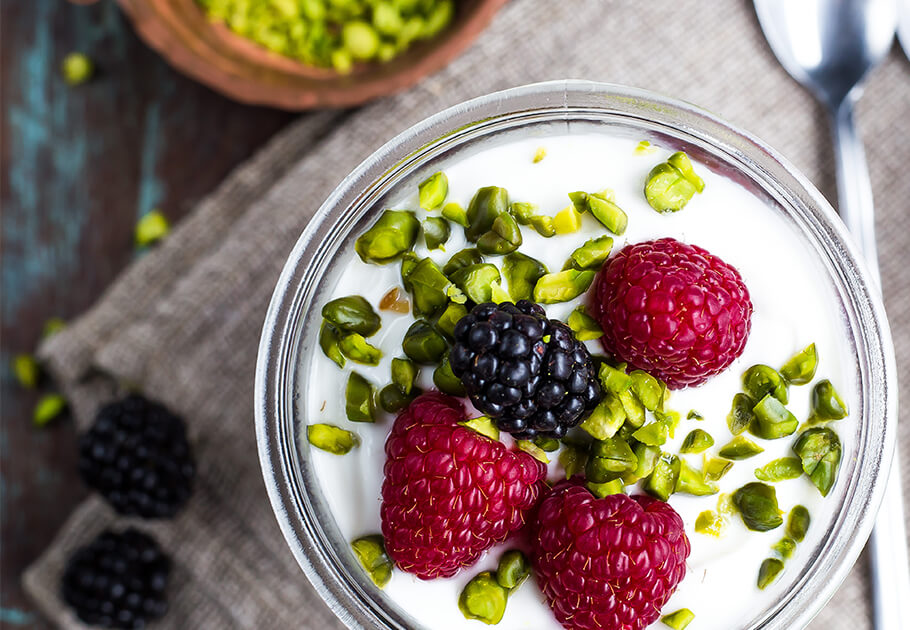
Food and cholesterol: Myth 8
Go ‘nuts’ for cashews to keep your heart healthy
FACT: Nuts are often promoted as a heart-healthy choice for snacking as most of their fat tends to be unsaturated – either high in polyunsaturated fats (such as walnuts and pine nuts) or high in monounsaturated fats (such as hazelnuts, pecans, almonds, and pistachios). Replacing foods high in saturated fat like cakes, biscuits and chocolate with foods high in unsaturated fat such as nuts, can help lower cholesterol. But that’s not to say that they’re free from saturates, though. Cashew nuts, like brazil nuts and macadamia nuts, contain quite a lot – in fact, a handful of cashews could add 3g to the maximum 20g saturates that health experts say that we should stick to each day – and of course, it’s easy to much your way through a larger quantity, too.
So, if cashews are your favourite nut, always choose unsalted and unsweetened varieties, and stick to one 30g portion (2 tablespoons). Why not mix it up and go for mixed nuts instead, or experiment with other tree nuts, as they each bring with them their own nutrient combo of vitamins, minerals, protein and fibre.
Food and cholesterol: Myth 9
Peanut butter is a healthier topping than jam on my morning toast
FACT: True. Peanut butter has reportedly overtaken jam as Ireland’s breakfast spread of choice and for good nutrition and health reasons. Peanut butters made ONLY from nuts contain no added sugar, whereas a tablespoon (15g) of jam typically contains around 10g of unhealthy ‘free’ sugars – and not much in the way of nutrients either. Better still, peanut butters labelled ‘made with 100% nuts’ are full of plant protein and fibre and can help you maintain healthy cholesterol levels – as most of the fat they contain is heart-healthy unsaturated fats.
But with supermarket aisles filled with an array of nut butters to rival regular crunchy or smooth peanut butter, it’s important to check labels and choose varieties that contain the fewest ingredients. As well as sugars and salt, palm and coconut oil are often added – both of which are high in saturated fat – the type that increases cholesterol levels. Finally, because peanut butter has a high-fat content, it’s high in calories, too (around 90 kcals per tablespoon) so go steady with your serving sizes.
Food and cholesterol: Myth 10
Cheese is a no-no for heart health
FACT: Knowing cheese is often high in saturated fat and salt, you’d be forgiven for thinking that the heart-healthy option is to leave it on the supermarket fridge shelf. But, before you cross cheese off your shopping list, it’s worth noting that cheese is specially packed with nutrients like protein and calcium, and research suggests that the saturated fat in cheese is less likely to raise cholesterol levels, as the same amount of saturated fat in butter.
The bottom line is that there are no ‘bad’ foods in moderation, so you don’t need to cut cheese out of your diet if you have high cholesterol or blood pressure – but it’s still important to choose wisely and keep a check on how much you eat, and how often. The recommended portion size is 30g (the size of a small matchbox), so weigh it out, so you become familiar with what that looks like.
Experiment with lower-fat cheeses, too, such as mozzarella, brie, Edam, feta or cottage cheese, as these choices all contain fewer saturates than hard cheeses. Or try mature reduced-fat cheddar cheeses – but don’t be fooled into thinking that ‘reduced fat’ is the same as ‘low fat’ – it’s not! It just means that it’s at least 30 per cent less fat than the original product.
Another trick to enjoying cheese sensibly is to choose stronger varieties when you’re cooking with cheese, which can give you more flavour in smaller quantities and grating cheese rather than slicing it means that you’ll use less in total, too.
Food and cholesterol: Myth 11
Bananas are good for cholesterol levels
FACT: Eating a banana a day may not keep the cardiologist away, but bananas, like all fruits, are an important part of a heart-healthy diet.
Bananas are packed with the usual vitamins and minerals that come with fruit and vegetables, especially potassium, which can help keep our blood pressure under control. Bananas also provide fibre – around 2.1g for a medium banana, that’s seven per cent of the recommended intake amount of 30g a day. Some of this fibre is pectin, a soluble fibre, which can help lower cholesterol. The resistant starch in bananas – particularly greener ones, also has a prebiotic effect, helping to feed our ‘good’ gut bacteria – and gut health is increasingly understood to be important for our heart health, too.
What’s more, bananas aren’t only one of the cheapest and most satiating fruits thanks to their higher carbohydrate content, but because they don’t require any preparation, they’re an easy way to get your 5-A-Day – one banana (80g) counts as one portion.
So, eating a banana a day is a fruity little addition to your quest for a happier heart – enjoy it sliced over your cereal, in a smoothie or incorporated into your healthier bakes.
* Plant stanol ester has been shown to lower cholesterol. High cholesterol is a risk factor in the development of coronary heart disease. A daily intake of 1.5-2.4g of plant stanols lowers cholesterol by 7-10% in 2-3 weeks as part of a healthy diet and lifestyle.
